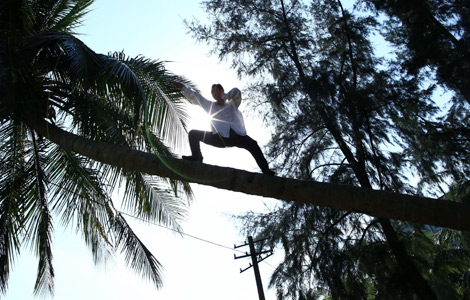Lifestyle changes behind breast cancer
Updated: 2013-10-31 07:09
By Wang Hongyi in Shanghai (China Daily)
|
||||||||
According to another health report, about 65 percent of women showed abnormal indicators in their breast checkups, such as cysts and lumps.
The results emerged after a review of about 260,000 adult female samples from the Ikang Guobin Healthcare Group, one of China's biggest healthcare companies.
Experts also said more younger women in China are getting breast cancer compared to those in other countries.
The disease is predominately found in the 40 to 45 age bracket, about 10 to 15 years earlier than in Western countries.
"In developing countries breast cancer usually presents itself at a younger age," Jonsson said. "There may be under-diagnosis of some groups of women in these societies, meaning that some old women with more indolent breast cancer may not reach medical attention and may not be registered."
He said another contributory factor can be that a Western lifestyle (diet, alcohol, obesity, for example) seems to increase the risk of breast cancer, albeit at a later stage and a lower aggressiveness. There may also be genetic factors influencing differences.
To provide better prevention and intervention, China's first health research project that evaluates risk factors among young women was launched this month.
The research program plans to compare three different groups of women under 40. The three categories are: healthy women, women with benign breast disease and women with breast cancer diagnosed within two years. It is hoped that the findings will provide clues to how to prevent and treat the disease.
"Although the incidence of breast cancer keeps rising, we found that the incidence among young women is not growing significantly," said surgeon Liu Guangyu at Shanghai Tumor Hospital affiliated to Fudan University, which is leading the research.
"On the other hand, incidences among middle-aged and older women are growing fast, which can infer that the incidence of breast cancer is less connected to environmental change, and we hypothesize that it might be genetic susceptibility or other factors," he said. "This study is expected to provide a more precise direction for young women to escape the disease."
The country's first smartphone application for breast cancer education was also launched along with the research.
By downloading the app, women can learn about breast cancer and how to check themselves.
Measures can be taken to reduce the risk, and early detection can help beat the disease.
Dr Yang Ziang at Zhongshan Hospital said establishing a healthy lifestyle and having regular medical checkups is important, as is diet.
Reducing the intake of high-fat and high-calorie food, exercising and refraining from smoking and drinking excessively also reduce the risk of cancer.

 Post-baby Duchess
Post-baby Duchess
 Victoria Beckham S/S 2014 presented during NYFW
Victoria Beckham S/S 2014 presented during NYFW
 'Despicable' minions upset Depp's 'Lone Ranger' at box office
'Despicable' minions upset Depp's 'Lone Ranger' at box office
 'Taken 2' grabs movie box office crown
'Taken 2' grabs movie box office crown
 Rihanna's 'Diamonds' tops UK pop chart
Rihanna's 'Diamonds' tops UK pop chart
 Fans get look at vintage Rolling Stones
Fans get look at vintage Rolling Stones
 Celebrities attend Power of Women event
Celebrities attend Power of Women event
 Ang Lee breaks 'every rule' to make unlikely new Life of Pi film
Ang Lee breaks 'every rule' to make unlikely new Life of Pi film
Most Viewed
Editor's Picks

|

|

|

|

|

|
Today's Top News
US business asks easing of market barriers
Benefit held for NYC official's ex-campaign treasurer
HIV epidemic needs education, not bath house bans
Tian'anmen jeep crash a terror attack
US spied on Chinese cities: report
Legislation to help reduce pollution
Survey examines education gap
Govt pledges more housing
US Weekly

|

|









